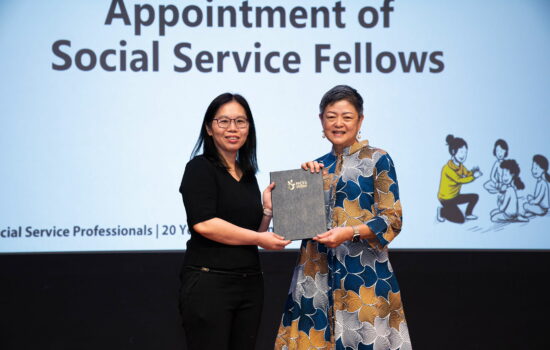Key takeaways:
- In collaboration with SPD’s Building Bridges EIPIC Centre, the applied drama and psychology students developed the interactive play on the topic of teamwork within a transdisciplinary (trans-d) team for their final year project.
- Teamwork is an essential quality in the trans-d approach used in the Early Intervention Programme for Infants and Children (EIPIC) which focuses on the collaboration among professionals as a team, as well as between professionals and families, to achieve the goals set for the children.
Stranded on a deserted island, five people from all walks of life had to battle the elements and their differences to survive. Will they be able to overcome their differences and make it out alive, together? This is the premise of “Stuck on an Island”, an interactive theatre programme produced by TRANSlink’D, a six-member student team from Singapore Polytechnic.
In collaboration with SPD’s Building Bridges EIPIC Centre, the applied drama and psychology students developed the interactive play on the topic of teamwork within a transdisciplinary (trans-d) team for their final year project.
Teamwork is an essential quality in the trans-d approach used in the Early Intervention Programme for Infants and Children (EIPIC) which focuses on the collaboration among professionals as a team, as well as between professionals and families, to achieve the goals set for the children.
The Singapore Polytechnic students saw their theatre programme being acted out at the SPD Ability Centre in August with the participation of 20 early intervention professionals.

The five characters in the play portrayed common stereotypical personalities such as the individualistic Lara, the clueless Auntie and the headstrong Alex. Facing a series of challenges that threatened their survival, they had to put aside their differences and learn to work together as a team to address a water crisis on the island.
There were ‘time-out’ periods during the two-hour play where participants came together to analyse and discuss the characters’ actions. This encouraged the participants to put themselves into the shoes of others and to consider the viewpoints of their colleagues and their working styles. The play concluded with the students acting out the ending based on the script written by the participants.

“The students acted out the characters very well. The characters and situations in the story reflect those that we see in reality and it highlights the importance of doing self-reflection on our words and actions,” said assistant EIPIC teacher, Ang Su Ling.
This collaboration has also allowed the students to put what they have learnt in the classroom to practical use in the real world. “This experience of working with professionals was both intimidating and exciting for us as students. However, we all grew a lot and found the project to be meaningful and memorable. We are thankful for the SPD staff in guiding us throughout this process and allowing us to showcase our abilities as applied drama practitioners,” said the TRANSlink’D team.





